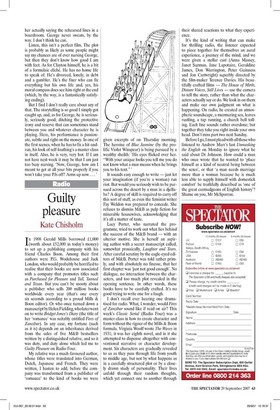Guilty pleasure
Kate Chisholm In 1908 Gerald Mills borrowed £1,000 (worth about £52,000 in today's money) to set up a publishing company with his friend Charles Boon. Among their first authors were PG. Wodehouse and Jack London, who would probably be horrified to realise that their books are now associated with a company that promotes titles such as Purchased for Pleasure and Tall, Tanned and Texan. But you can't be snooty about a publisher who sells 200 million books worldwide every year (that's one every six seconds according to a proud Mills & Boon editor). Or who once turned down a manuscript by Helen Fielding, who later went on to write Bridget Jones's Diary (the title of her 'romance' was suitably entitled Fires of Zanzibar). In any case, my fortune (such as it is) depends on an inheritance derived from the sales of five M&B bestsellers written by a distinguished relative, and so it was duty, and duty alone which led me to Guilty Pleasure on Radio Four.
My relative was a much-favoured author, whose titles were translated into German, Dutch, Japanese and French. They were written, I hasten to add, before the company was transformed from a publisher of 'romance' to the kind of books we were given excerpts of on Thursday morning. The heroine of Blue Jasmine (by the prolific Violet Winspear) is being pursued by a wealthy sheikh: 'His eyes flicked over her. "With your unique looks you tell me you do not know what a man means when he brings you to his tent."' It sounds easy enough to write — just let your imagination (if you're a woman) run riot. But would you seriously wish to be pursued across the desert by a man in a djellaba? A degree of skill is required to carry off this sort of stuff, as even the feminist writer Fay Weldon was prepared to concede. She refuses to dismiss M&B as pulp fiction for miserable housewives, acknowledging that it's all a matter of taste.
Lucy Porter, who narrated the programme, tried to work out what lies behind the success of the M&B brand — with an ulterior motive. She is herself an aspiring author with a secret manuscript called, somewhat prosaically, Laughter and Tears. After careful scrutiny by the eagle-eyed editors of M&B, Porter was told rather primly, and with absolutely no finesse, that her first chapter was 'just not good enough'. No dialogue, no interaction between the characters, and too much plot revealed in the opening sentence. In other words, these books have to be carefully crafted. It's no good trying to write one for a laugh.
I don't recall ever hearing one dramatised for radio. What, I wonder, would Fires of Zanzibar sound like if read on air? This week's Classic Serial (Radio Four) was a master-class in how to create character and form without the rigour of the Mills & Boon formula. Virginia Woolf wrote The Waves in 1931; it was her eighth novel, and in it she attempted to dispense altogether with conventional narrative or character development. Six characters are gradually revealed to us as they pass through life from youth to middle age, but not by what happens as in a carefully structured plot or by a closely drawn study of personality. Their lives unfold through their random thoughts, which yet connect one to another through their shared reactions to what they experience.
It's the kind of writing that can make for thrilling radio, the listener expected to piece together for themselves an aural experience, a journey of the mind, and we were given a stellar cast (Anna Massey, Janet Suzman, Jane Lapotaire, Geraldine James, Don Warrington, Peter Guinness and Jon Cartwright) superbly directed by the film-maker Terence Davies. His beautifully crafted films — The House of Mirth; Distant Voices, Still Lives — use the camera to tell the story, rather than what the characters actually say or do. We look in on them and make our own judgment on what is happening. On radio, he created an atmospheric soundscape, a murmuring sea, leaves rustling, a tap running, a church bell tolling. Each line sounds rather overdone; but together they take you right inside your own head. Don't miss part two next Sunday.
Before I go, I must plead with all those who listened to Andrew Marr's last Unmasking the English on Monday to ignore what he said about Dr Johnson. How could a man who once wrote that he wanted to 'place himself as a kind of neutral being between the sexes', or that 'a man needs marriage more than a woman because he is much less able to supply himself with domestick comfort' be truthfully described as 'one of the great curmudgeons of English history'? Shame on you, Mr McSporran.























































 Previous page
Previous page